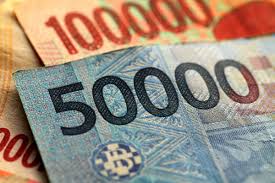The BI Board of Governors agreed on 24th and 25th April 2019 to hold the BI 7-Day Reverse Repo Rate at 6.00%, while also maintaining the Deposit Facility (DF) and Lending Facility (LF) rates at 5.25% and 6.75%, respectively. The decision is consistent with continuing efforts to strengthen the external stability of the national economy. Meanwhile, to stimulate domestic demand, Bank Indonesia expanded its accommodative policy stance as follows:
- Increasing available liquidity and supporting financial market deepening by strengthening the monetary operations strategy;
- Enhancing retail payment efficiency by expanding National Clearing System (SKNBI) services, namely through an extended settlement time with faster settlement, an increase in the nominal transaction ceiling and lower tarifs;
- Increasing the supply of Domestic Non-Deliverable Forward (DNDF), in particular by simplifying the regulations concerning underlying transactions;
- Implementing market operator regulation in the money market and foreign exchange market;
- Developing the Commercial Papers (SBK) market as an alternative source of short-term funding for the corporate sector;
- Expanding electronification of the noncash social aid program (bansos), village fund program, transportation sector and fiscal operations.
Bank Indonesia is also strengthening coordination with the Government and other relevant authorities to maintain economic stability, particularly in terms of controlling inflation and reducing the current account deficit, while simultaneously building economic growth momentum through solid domestic demand, including stimulating exports and tourism as well as attracting foreign capital inflows.
Global economic gains are occurring more slowly than expected with less financial market uncertainty.Economic growth in the United States is moderating on lower incomes and retreating business confidence, limited fiscal stimuli as the impact of the corporate tax cuts fades, and ongoing structural labour market issues. Similarly, China’s economy is still decelerating although the authorities have implemented expansive fiscal policy in the form of tax reductions and infrastructure development. Economic growth in Europe remains constrained by weak export performance and unresolved financial sector issues, coupled with the structural challenge of an ageing population. Lower-than-expected economic growth has also been confirmed by countries in Latin America and the Middle East. Congruent with global economic moderation, world trade volume and international commodity prices are tracking downward trends, notwithstanding the oil price, which increased during the previous period due to geopolitical factors. The global monetary policy response has not been as tight as previously anticipated, thus alleviating global financial market uncertainty. On one hand, global economic developments represent a clear challenge in terms of stimulating exports, yet on the other hand, less global economic uncertainty has attracted foreign capital flows to developing economies, including Indonesia.

Bank Indonesia projects solid economic growth in the first quarter of 2019, driven by domestic demand. Strong consumption growth is expected to persist on maintained public purchasing power and continuing fiscal stimuli, including social aid disbursements and election spending. Investment has declined slightly in line with seasonal trends at the beginning of the year yet is predicted to regain momentum in subsequent periods, supported by improving business confidence and ongoing infrastructure development projects. Nevertheless, global economic moderation and sliding international commodity prices have restrained the contribution of net exports. Moving forward, the promising domestic economic outlook is supported by solid domestic demand in line with maintained confidence in the national economy. Furthermore, the policy mix instituted by Bank Indonesia, the Government and other relevant authorities will continue to sustain economic growth momentum, which Bank Indonesia projects in the 5.0-5.4% range in 2019.
Indonesia’s balance of payments (BOP) is predicted to record a surplus in the first quarter of 2019, thereby bolstering external stability. The favourable BOP outlook is based on a narrower current account deficit coupled with a significant capital and financial account surplus. The prospect of a narrower current account deficit is supported by a notable bump in the trade surplus from USD0.33 billion in February 2019 to USD0.54 billion in March 2019. The increase stemmed from a larger non-oil and gas trade surplus combined with a lower oil and gas trade deficit. Meanwhile, an influx of foreign capital inflows, totalling USD5.5 billion in March 2019, boosted the significant capital and financial account surplus.Consequently, the position of reserve assets stood at USD124.5 billion at the end of March 2019, equivalent to 7.0 months of imports or 6.8 months of imports and servicing government external debt, which is well above the international standard of three months. Looking forward, policy synergy will remain focused on efforts to reinforce external resilience. Measures to stimulate exports and tourism as well as control imports will be maintained in 2019, thus maintaining the current account deficit within a manageable range of 2.5% of GDP. Furthermore, policy will also be directed towards attracting capital flows to offset the current account deficit.
The rupiah continues to appreciate as external sector performance improves. As of 23rd April 2019, the rupiah strengthened 1.17% (ptp) compared with conditions at the end of March 2019 or by an average of 0.58% compared with the March 2019 average. In comparison with exchange rates in 2018, the rupiah has appreciated by 2.17% (ptp) or by an average of 0.80%. The strong rupiah is closely linked to a deluge of foreign capital inflows to the domestic financial markets, including a sustained flow of non-resident capital to the domestic stock market in April 2019. Looking ahead, Bank Indonesia predicts stable rupiah exchange rates and maintained market mechanisms in line with the promising external sector outlook, supported by a favourable domestic economic outlook and milder financial market uncertainty risk. To support exchange rate policy effectiveness and strengthen domestic financing, Bank Indonesia will accelerate financial market deepening efforts, targeting the money market and foreign exchange market.
Low and controlled inflation was confirmed in March 2019. The Consumer Price Index (CPI) recorded 0.11% (mtm) inflation in March 2019 or 2.48% (yoy) annually, after experiencing seasonal deflation of 0.08% (mtm) the month earlier, or 2.57% (yoy) inflation. Inflation was controlled in March 2019 with the help of slower core inflation and another period of deflationary pressures on volatile foods (VF). In contrast, however, rising airfares edged up inflationary pressures on administered prices (AP). The trend of lower inflation over the past few years, including controlled price pressures on volatile foods, has successfully maintained public purchasing power, especially amongst low-income earners. Moving forward, Bank Indonesia will consistently maintain price stability and strengthen policy coordination with the Central and Regional Government in order to control low and stable inflation within the target range, namely 3.5%±1% in 2019. Furthermore, Bank Indonesia will coordinate intensively with the Government and other relevant authorities to control inflation during the holy fasting month of Ramadan and Eid-ul-Fitr 1440.
Financial system stability has been maintained amidst a stable intermediation function and contained credit risk. The Capital Adequacy Ratio (CAR) of the banking industry remained high at 23.4% in February 2019, accompanied by a low level of Non-Performing Loans (NPL), namely 2.6% (gross) or 1.2% (nett). In terms of the intermediation function, the banking industry reported stable growth of outstanding loans in the reporting period at 12.1% (yoy), up slightly from 12.0% (yoy) in February 2019. In addition, deposit growth reported by the banking industry accelerated to 6.6% (yoy) in February 2019 from 6.4% (yoy) in January 2019. Meanwhile, the ratio of liquid assets to deposits stood at 22.3% in February 2019, indicating adequate liquidity in the banking system. The performance of public listed corporations improved in the reporting period in line with increasing activity, as reflected by higher profitability and repayment capacity. Moving forward, Bank Indonesia perceives adequate space to expand credit growth without disrupting financial system stability considering that the credit cycle is below the optimal level with an outlook of solid and increasing demand. Bank Indonesia projects high growth of loans disbursed by the banking industry towards the upper end of the 10-12% (yoy) range, supported by deposit growth forecasted in the 8-10% (yoy) range.
The payment systems, both cash and noncash, remain uninterrupted. Cash payments posted positive growth in the reporting period with the position of currency in circulation growing 5.6% (yoy) in March 2019 and non-cash payments consistently enjoying a faster uptake. Retail transactions through ATM/debit cards, credit cards and e-money accelerated to 17.1% (yoy) in February 2019, with e-money transactions growing impressively by 77.6% (yoy). Retail payments still dominate ATM/debit card transactions, accounting for 94.8% of total retail payment system transactions and growing by 16.6% (yoy). The use of e-money is also still gaining popularity, boosted by the current shift in payment preferences as well as the proliferation of goods purchased online through e-commerce.
Bank Indonesia is continuing to expand the electronification program, targeting social aid and village fund disbursements, different transportation modes and fiscal operations, which is expected to strengthen the payment system’s role in terms of facilitating productive economic activity. Finally, Bank Indonesia will ensure adequate supply of rupiah banknotes and coins in appropriate denominations throughout the Indonesian archipelago during Ramadan and Eid-ul-Fitr 1440.
Jakarta,
COMMUNICATION DEPARTMENT
Onny Widjanarko
Executive Director












